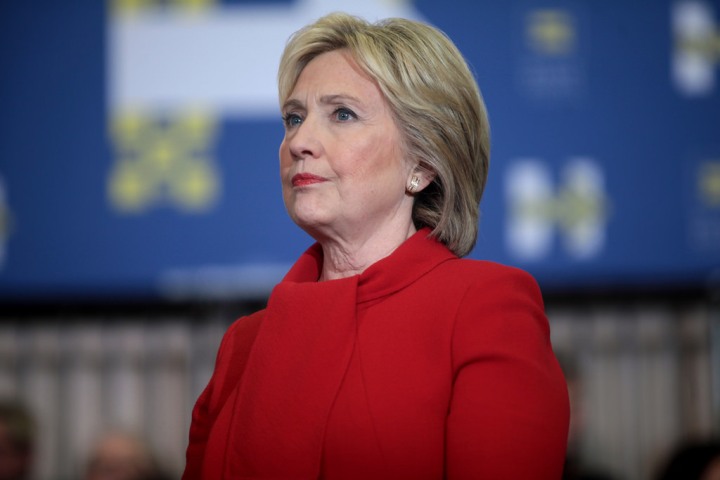
It has been almost impossible in the past few days following 9/11 to escape the seemingly never-ending news cycle centered around a sudden bout of illness Secretary Clinton suffered during a memorial service on Sunday, causing her to take an unplanned leave of absence from the campaign trail. First reports of the incident said that Clinton got ‘overheated’ and needed to go back to her daughter Chelsea’s Manhattan apartment to rehydrate. Then came amateur footage (courtesy of one Zdenek Gazda’s smartphone) appearing to show Clinton stumbling and possibly even fainting as she was guided into her motorcade to leave the ceremony at Ground Zero. Within hours, Clinton’s on-again off-again health issues (and the relative secrecy surrounding them) zipped back into the global spotlight. Trump was uncharacteristically quiet about her ailment – in fact the only Twitter post he made Sunday was this one:
But it was only a matter of time before her many other political enemies began putting pressure on the Clinton camp regarding her fitness for presidency.
The New York Times published a variety of articles on the incident, but there were two in particular which caught my eye: “Hillary Clinton Is Set Back by Decision to Keep Illness Secret” and “An Unplanned Absence for Hillary Clinton at an Inopportune Time.” Both articles dealt with explaining and analyzing how Clinton’s natural tendency to secrecy on any and all private matters (including not telling anyone outside of her family and top aides about her diagnosis of pneumonia which she received last Friday) did nothing to help her constantly fluctuating poll numbers and negative public perception as someone untrustworthy. Clinton in speaking to CNN’s Anderson Cooper justified her decision to withhold the important diagnosis by saying, “I just didn’t think it was going to be that big a deal.” Yet as we saw over and over again on all major news networks (and late night entertainment):
it most definitely was a big deal. The second article, an analysis of her decision to leave the campaign trail for a few days in order to recuperate, best explains it here:
Her campaign’s handling of the episode has also exacerbated an impression that she is overly guarded, a trait that Clinton allies have long attributed to an endless feedback loop: She retreats to secrecy because she distrusts the news media, they say, creating a sense that there is something to hide, which makes reporters more wary.”
But in this instance, it was her secrecy which triggered the ‘endless feedback loop.’ As the article explains, Clinton didn’t even disclose where she was for several hours following her abrupt departure from the memorial, and it was only on Monday when she finally revealed her diagnosis and announced she would not be heading to the West Coast to campaign. And while Clinton did end up finally releasing her more thorough medical records, she waited three whole days after the fact to do so.
In one article from the Washington Post, “Body doubles, secret doctors: Clinton conspiracy theories blossom after pneumonia diagnosis,” the case was made that the Clinton campaign’s more defensive, reactionary response ultimately hurt them in the end by allowing an enormous amount of outlandish theories (It’s Parkinson’s! Must be seizures! She secretly uses a body double!) to run amok. I think MSNBC’s Andrea Mitchell, quoted in the article, perfectly articulates it here:
“The whole issue of transparency and this only reinforces all of the conspiracy theories, ” said Mitchell. “I mean, we’ve all been trying to fact-check and pointing out that there’s nothing wrong with her.”
In the end we as voters, Clinton’s entire campaign and future campaign managers can gain two main insights from this episode: proactiveness and disclosure. Never assume a story is going to be just a small blip on the network radar, and always try and be as forthcoming as possible when personal matters arise. Both Clinton and Trump (and Johnson) have a definitive right to privacy, but it is limited by the fact that they choose to be public figures and even more limited by their choice to run for the highest office of the United States. The people have spoken: they demand transparency. And from now on, whoever can best provide it may hold the golden ticket to winning in November.